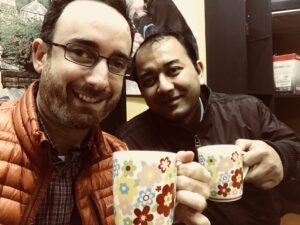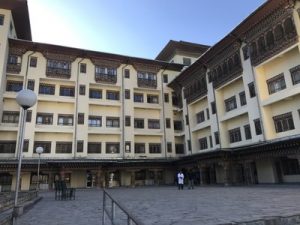
Far away in a small Himalayan kingdom, where light and color have a mystical allure and steep mountains hold thousand-year-old Buddhist monasteries, a country pursues gross national happiness, measured by the collective well-being of its people. Physically isolated from most of the world until the 1960s, Bhutan was only accessible by foot, from a northern route through the passes of Tibet, or a southern route through subtropical plains from India’s Assam and West Bengal. It is because of this challenging topography that Bhutan has retained its ancient traditions and cultural heritage.
For UNC Pediatric Nephrologist Dr. Dorey Glenn, it can take two to three days of travel before his plane touches down in Paro, then there’s a two-hour drive to the capital of Thimphu. There, Glenn is working with the pediatric physicians, residents and staff at Jigme Dorji Wangchuck National Referral Hospital, named for the dynasty that replaced Buddhist rule in 1902. His relationship with the hospital and National University of Bhutan began a few years ago. Today, he’s working with the hospital’s department of pediatrics to provide nephrology training and clinical support.

“The burden of kidney disease has not been previously described,” said Glenn. “We are starting to describe the number of children presenting to the referral center with renal disease, but have no data describing how many children have chronic kidney disease in the community.”
In a country that’s mountainous, that has roads, but is still developing, being able to look at epidemiology in a rural environment is not easy. But what is special about Bhutan–beyond the cultural beauty of spinning prayer wheels and colorful prayer flags, believed to generate spiritual vibrations when touched by the wind–is the country’s strong commitment to caring for its citizens, so strong that it sends patients to neighboring countries to get health services that aren’t available in Bhutan.
“When medications aren’t available in the country, there’s a process for bringing them in from the outside. The Bhutanese are very dedicated to providing high-level care with the resources they have, and to developing healthcare resources within the country. This is increasingly the case for patients needing dialysis and renal transplantation.”
Mentoring in Medical Education
Glenn is working with pediatric resident Dr. Dinesh Pradhan on a project to streamline management of children that present with glomerulonephritis. This includes a decision support tool that can help pediatric staff stratify patients who need more extensive work up, from those who need less. It will also facilitate more uniform care across the spectrum of patients, and at the same time help physicians become more time and cost efficient with testing, giving those patients at high risk or with atypical presentations more directed work up. Pradhan presented a poster abstract at an Asian conference in Malaysia last year.
“The project first described all hospital admissions for glomerulonephritis in the year before we
mplemented the tool,” said Glenn. “We implemented the support tool and collected data capturing disease outcome, length of stay, and referral out-of-country for additional testing such as renal biopsy.”
Glenn says the tool will differentiate patients who have typical presentation of disease and those who are more worrisome or at higher risk. “We’re still collecting data and our goal is to publish a paper with our findings. Dinesh is a dedicated, hard-working physician. I think highly of his clinical skills, but also his interest in improving systems.”
Planning His Return
Glenn will continue this work in April, with a trip partially funded by a Global Partnership Award from UNC Global.
He’ll also introduce UNC Kidney Center clinicians who have an interest in global health education, who will give teleconference lectures to the dialysis unit and house staff. Talks will include a variety of general pediatric nephrology topics, dialysis complications and quality improvement.
“We’ll provide more in-depth education into nephrology issues and how to manage them. And similar to the project with Dinesh, we’ll institute interventions to help standardize and streamline care, whilealso working toward additional therapies, like being able to provide acute peritoneal dialysis or kidney biopsy.”
Although difficult to reach and expensive, Glenn knew Bhutan was special, even before he traveled.
“I had heard wonderful things about the engaged and enthusiastic physicians at the national hospital from a colleague who had previously worked there. I hope to inspire the residents to pursue formal pediatric nephrology training so that they can develop clinical care and pursue research questions on their own.”